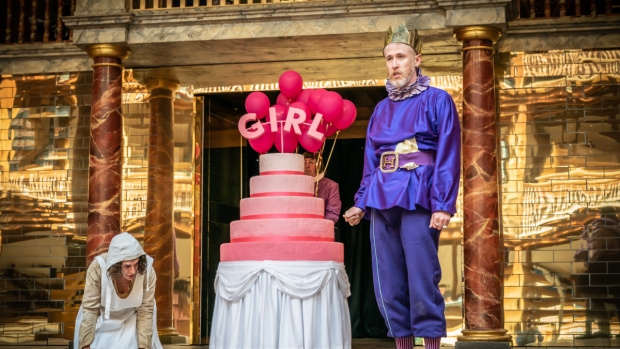Henry VIII at Shakespeare's Globe – review
The Globe play fast and loose with the famous monarch

© Marc Brenner
If you head to the Globe for this bracingly anachronistic revision of Tudor history, you can expect to see Henry VIII on more than one type of throne. That's right: midway through the first half, Adam Gillen's weird, wired King is rolled on atop a golden lavatory, his Royally purple boxer shorts at half mast. He keeps his crown on though. It's a funny, if unexpected, sight….one of many, as it turns out.
That's not even the most vulgar thing in Amy Hodge's gaudy, free-wheeling staging: a giant golden set of inflatable male genitalia gets thrown around and mounted, there's a party scene where the King, sporting an outsized dildo, frolics amongst bumping and grinding courtiers, and Anne Bullen (Boleyn) has a blue balloon shoved up the front of her dress to denote pregnancy (it's that colour because Henry is desperate for a male heir, though we all know that she's carrying the future Queen Elizabeth I). This leads to a section where cascades of pink and blue balloons are released from above with Henry frantically bursting all the pink ones, and you don't need to be particularly perceptive to work out what THAT all means.
So, yes, if you're after nuance, or indeed historical authenticity, this isn't the show for you. It's not even the full William Shakespeare and John Fletcher text: this version is billed as a collaboration with the Globe's resident writer Hannah Khalil, although quite how you can "collaborate" with a pair of playwrights who have been dead for more than 400 years isn't clear.
In fact, what Khalil has achieved here is pretty bold and interesting: in a strongly feminist spin on the familiar history (the play covers the monarch's first two marriages, the betrayal of Wolsey, the creation of the C of E, and ends with the birth of Elizabeth I) she has put Queens Katharine (of Aragon) and Anne front and centre, and inserted Princess Mary (Stuart, later the Queen) as a character. The original text has been capably filleted, characters cut, and ‘new' speeches and lyrics inserted from an amalgam of the Bard of Avon's other works (Shakespeare enthusiasts will enjoy spotting which play or sonnet is being pilloried at any given time).
None of the male characters come out of this new version well, and the sense of barely suppressed anarchy that runs throughout the entire show sometimes threatens to obscure more serious elements of the text: for instance, Henry abandons Catholicism with barely a shrug and a sideways glance at the groundlings. Purists might balk, but it's not as if Henry VIII was a particularly great play to start off with, lurching inconsistently between intrigue and sycophancy, so why not have a little fun with it, and reclaim it for arguably more enlightened, less openly misogynistic times.
The Globe similarly played fast and loose, under Emma Rice's watch, with Cymbeline, another of Shakespeare's most flawed works, back in 2016, changing the title to that of its heroine Imogen. It's surprising then that this new history play hybrid hasn't been rechristened Queen Katharine as she feels like the primary focus here, especially in Bea Segura's remarkable performance. Vivid and powerful, she is both the beating heart and driving force of this production, magnificent when standing up for herself, poignant yet formidable while pleading for mercy for Jonah Russell's wronged Buckingham, and her death scene is the only time when the show acquires any emotional depth. Her accent adds rich flavour to the language, which she delivers with considerably more authority and expression than a number of the native English speakers in the company.
Janet Etuk's Anne is characterised as an intelligent young woman blithely unaware of the agony she has caused Henry's preceding Queen, and Kevin McMonagle is a drolly nasty Chamberlain. Jamie Ballard's treacherous Wolsey, first discovered squirrelling gold bullion bars into a personal briefcase, lest we think he's a traditional man of God, is intriguingly low key for the most part – like a scarlet silk-clad Iago – which makes his outbreak of quickly checked violence all the more unsettling.
Maimuna Memon and Tom Deering's folky, impassioned songs are put over with full-throated passion by Genevieve Dawson and the company. Hodge's production has a slight sense of hurling everything at the wall to see what sticks, but the outrage at the mistreatment and marginalisation of women comes with an authentic tang of rage: it's not Emilia but it's in the same ballpark. It's messy but appealing, and about as subtle as being smacked over the head with a copy of a particularly voluminous history book about the Tudors: you may end up a bit dazed but you're unlikely to be bored.













